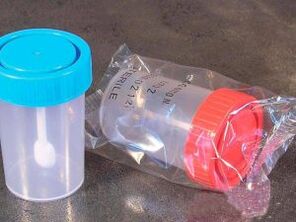Symptoms of the parasite's presence in the body often seem incoherent and inexplicable, and although this thought is frightening, they are more common than many people think. There are many organisms in the world - worms, protozoa that can parasitize most of the human internal organs and cause symptoms of many different diseases. You can learn which tests to look for parasites and when to do this test.
When do I need to be tested?

Usually, infection of parasites occurs when eating vegetables and fruits that are not washed, meat, fish, and raw water are not thoroughly processed, as well as when contact with family when sharing utensils and utensils. play in children.
There are the following types of parasites:
- Protozoa (lamblia, amoeba, plasmodium malaria).
- Parasitic arthropods (demodex ticks, a pathogen of scabies).
- Worms (helminths).
The most common parasitic diseases are caused by helminths and occur in young children, pet owners, and people in difficult social situations.
The main feature of the parasites is their discreet existence at an early stage. For a long time after infection, they do not manifest in any way and cause markedly advanced symptoms.
You can recognize the presence of parasites in the body through the following manifestations:
- Flatulence, flatulence, constipation, diarrhea, stomach, intestinal pain.
- Decreased or increased appetite, discomfort after eating.
- Weight loss without motivation.
- Skin itching, confusing rash, dermatitis, urticaria.
- Pale skin, increased fatigue or a diagnosed anemia (usually iron deficiency).
- Overwork, sleep disturbances (drowsiness, insomnia).
- You grind your teeth while sleeping, coughing lasts
If these symptoms appear, you should consult a general practitioner and get tested for parasites.
What tests do the parasites transmit?

There are many studies to determine the presence of parasites (protozoa, arthropods, helminths) in the body.
Since the most common diseases are helminthiasis, the best way to test for parasites is a stool test.
To conduct a standard study, the patient will need to collect three separate stool samples from different areas of the same section into a sterile container and deliver the biological material to the laboratory as soon as possible. . A lab-doctor assistant examines the samples obtained under a microscope and is able to identify both live parasites and from eggs.
A standard stool study for worm eggs isn't always very informative. Due to the nature of the parasite's life cycle, in the sample, instead of an egg or an adult, there may be dead worms or their fragments that cannot be used to diagnose the disease.
More information than extensive analysis, using polymerase chain reaction. This technology allows the detection of the DNA of the helminth even when it is dead, in a state of hibernation, or just fragments of the organism that have entered the material under study.
To say exactly whether there are parasites in the body or not, the test must be done at least three times on different days. According to statistical data, the accuracy of a single study is 50%, while with a triple study it increases to 99%.
Another equally important analysis is the serum response - the determination of the level of antibodies to the parasite. They can determine acute (IgM) and chronic or chronic (IgG) helminth infiltration. In addition, they were able to identify parasitic infections not found in feces.
Certain species of helminths parasitize the bile ducts, and can also form cysts in the lungs, liver, and brain. They can be suspected by the respective clinical symptoms and detected using serological tests, X-rays, CT or MRI, as well as biopsy.
For the diagnosis of parasitic skin diseases (scabies, filariasis, certain types of helminths), scraping and skin biopsy, specific tests (iodine) and serological tests are used.
What tests should adults do to look for parasites?

Adults are less susceptible to helminth infections, as they adhere to more strict personal hygiene rules, they eat less unwashed fruits and vegetables from the garden and also have less contact with street animals during games. .
Adult helminth testing is required when there are some nonspecific complaints (stomach and intestinal pain, prolonged skin itching, rash, weakness, fatigue, anemia) for all patients prior to admission. and also regularly as part of preventive research for certain types of workers.
These include employees of the food industry, people who work with children (caregivers and nurses in kindergartens, teachers, head of sports). These people should definitely be tested for filariasis and roundworm.
Hunters and farmers should be regularly screened for helminthiasis and strongyloidiasis; It is important that fishermen have serological tests for roundworm disease. More information on what tests should be done in this or that situation can be obtained from the therapist.
What tests do parasites pass to a child?

Each child needs to be fully diagnosed to identify worms and prescribe effective therapy against them before going to kindergarten and primary school (on admission, after a long rest or illness). In addition, in preschool institutions and schools, it is imperative to conduct regular preventive examinations to detect helminth infections in the early stages and prevent their spread.
To diagnose helminthiasis, the child should go for an overall analysis of the stool, as well as scraping the pus in the folds around the anus.
Tartar scraping is recognized as the most effective and accurate method for diagnosing filariasis (a pinworm disease). In this process, before going to the toilet and perineal toilet, a special cotton swab, spoon or small transparent bandage is taken from the folds around the anus, then glued on a slide and examined. under a microscope. . When there is an illness, the lab assistant will find pinworm eggs in the test material.
Treatment of parasitic diseases prescribed by a doctor or pediatrician, in difficult cases - by a doctor who specializes in infectious diseases. With skin lesions (certain helminthiasis, scabies or dermatosis), the therapy of choice is a dermatologist.
It is important not to delay contacting a specialist if you suspect a parasitic disease, as delaying treatment can lead to complications for the patient himself and also increase the risk of infection. infect others.



































